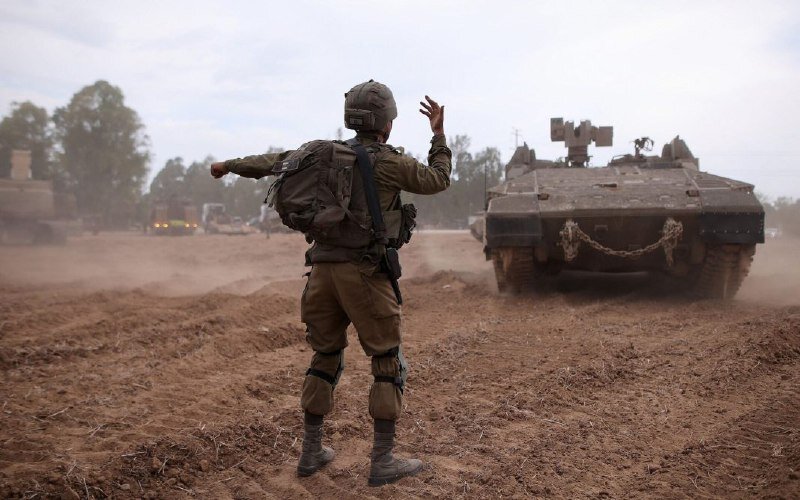Why Israel’s invasion of Gaza is still pending

TEHRAN - Israel has been talking up a supposedly upcoming ground offensive into Gaza over the past days. Despite attempts by the Israeli regime to project a united front and strong military presence, recent events indicate that Israel’s military as well as its cabinet are grappling with internal challenges following the attack by Hamas on October 7.
Tensions are escalating within Israeli forces, particularly involving high-ranking leaders, suggesting a strained atmosphere. Prime Minister Benjamin Netanyahu, in particular, has faced calls from various Israeli politicians and settlers to step down.
As reported by Israeli daily Yedioth Ahronoth on Monday, three Israeli ministers are contemplating resignation to “hold Netanyahu accountable” for the recent Palestinian attack.
The prime minister is also being given the cold shoulder by the military. A video shared online on Saturday shows Netanyahu getting confronted by an Israeli soldier during his visit to a base in the southern region of the occupied territories. The soldier could be heard expressing strong criticism, stating, "You slaughtered all my friends! You have brought ruin upon Israel," while another soldier attempted to prevent him from approaching Netanyahu.
The rift between Israeli politicians and military officials seems to have already taken a toll on the mentality of the regime’s soldiers. Hebrew media outlets have reported that four Israeli soldiers have taken their own lives since the Hamas resistance movement shook the occupied territories through a surprise attack.
With these circumstances, several military figures from Israel have come forward in the past days trying to warn the regime against launching a ground offensive into Gaza.
Yigal Carmon, a former colonel from Amman who previously served as an advisor to two Israeli prime ministers, is among the well-known figures cautioning the Israeli regime about such an attack, suggesting that the regime is barking up the wrong tree. "We don't have enough information about the situation on the ground and our forces have not been sufficiently trained," he said during an interview with Israeli television last week adding that attacking Gaza on the ground could soon backfire and turn into an even bigger crisis than the regime is already experiencing.
American military analysts have also been trying to warn Israel against the act. "Israel can refuse to walk into the trap that Hamas has set up," Edward Story, a retired U.S. Army infantry officer, and Dennis Aftergut, a former federal prosecutor, wrote on MSNBC on Friday. The two tried to persuade Israeli forces that they should not feel "ashamed" if they decide to refrain from a direct battle with Hamas.
Top American officials have also expressed the same concerns. Pentagon chief Lloyd Austin announced on Monday that an Israeli invasion of Gaza would be “extremely difficult”.
In addition to the evident demoralization among Israeli soldiers and the growing disconnect between the military and the far-right Israeli cabinet, practical factors on the ground further complicate and hinder the possibility of an offensive into Gaza for the Israeli regime.
Palestinian resistance fighters are known for their intricate tunnel network beneath Gaza. These tunnels, reportedly reaching depths of at least 100 meters, pose significant challenges for Israeli forces who have limited knowledge of the underground terrain. Some have drawn parallels between this situation and the 1942 Battle of Stalingrad during World War II, where Nazi Germany, despite outnumbering Soviet Union forces and possessing superior equipment, struggled to overcome the Soviet Union's preparedness and adeptness in underground warfare. The Battle of Stalingrad resulted in the loss of an estimated 1.2 to 2 million lives.
It is believed that at least 100,000 Hamas fighters are waiting for Israeli forces to enter Gaza. However, If Israel decides to invade the territory, it will might not only have to contend with Hamas but also face an even bigger enemy: The Lebanese resistance movement led by Hassan Nasrallah, which many analysts say will join the conflict in case of Gaza invasion.
Since 2006, Hezbollah has become Israel's primary source of concern. However, its military capabilities have significantly evolved since their last confrontation. Hezbollah now possesses tens of thousands of powerful missiles, capable of bypassing Israel's Iron Dome defense system and striking any point within the occupied territories. The presence of 2,000 American marines floating in the Mediterranean, cautiously staying away from the shoreline, is unlikely to provide significant assistance to Israel if Hezbollah decides to unleash a barrage of missiles upon the occupied territories.
Furthermore, the potential for additional fronts to open against Israel in Syria and Yemen adds to the complexity. Both countries possess well-equipped forces, on par with Hezbollah, thus increasing the challenges Israel would face on multiple fronts.
Overall it seems that the masterminds of Hamas have caused Israel to get caught between a rock and a hard place. The regime needs to launch an offensive into Gaza to make up for its humiliating intelligence and military defeat on October 7, but that might get it into an even bigger crisis. Even if Israel manages to overcome its military and political challenges, invade Gaza, and remove Hamas, another Hamas is sure to appear soon after and create the same issues for the regime. The Palestinians’ struggle for national liberation is not going to end through bombardments or invasions.
culled from Tehran Times

